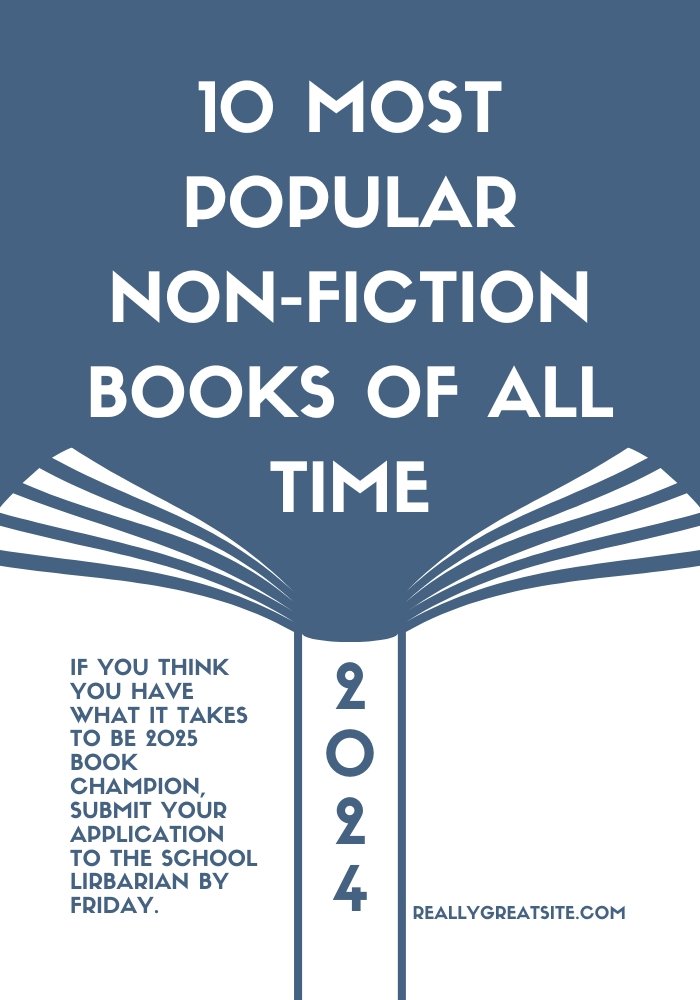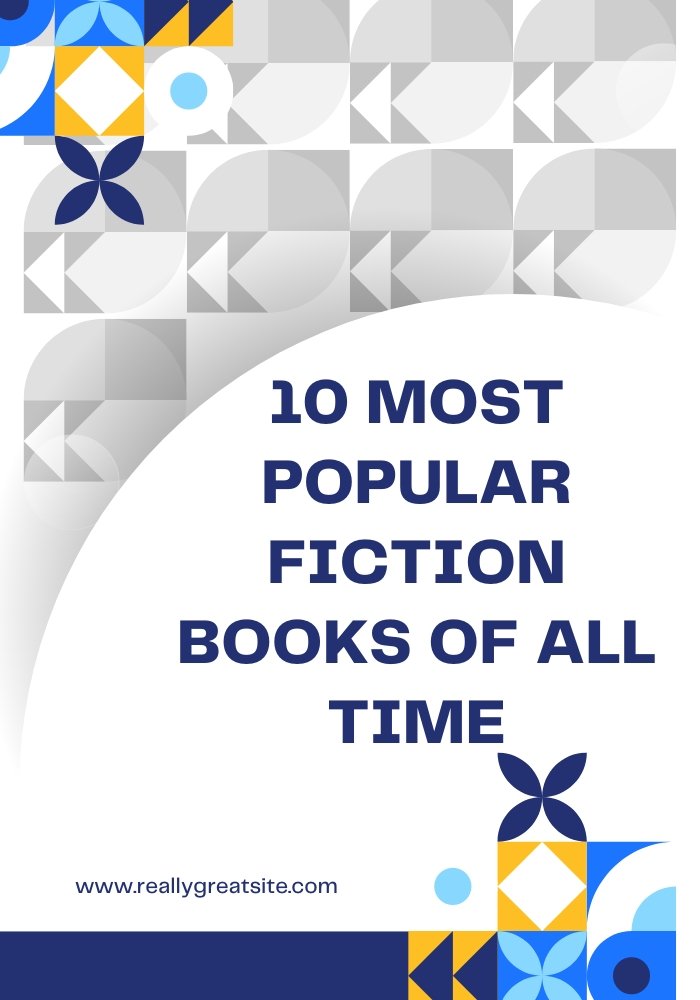Welcome, dear readers, to a journey through the pages of history, thought, and human emotion. Today, we embark on an adventure across time and consciousness, exploring the ten most popular non-fiction books of all time. These aren’t just books; they are windows to the world, each offering a unique perspective on the human experience. They challenge us, inspire us, and sometimes even change us. If you’re on a quest for understanding, for stories that resonate with truth and the raw essence of life, then this guide is for you. Why should you read these books at least once in your lifetime? Because they encapsulate the triumphs, the struggles, and the sheer resilience of the human spirit. Let’s dive in, shall we?
Let’s take a closer look at each book, applying the refined approach:
1. “The Diary of Anne Frank” by Anne Frank
 Anne’s diary offers a heartrending glimpse into her world of hope, fear, and longing during the Holocaust, deeply connecting with readers’ emotions about human endurance in the face of despair.
Anne’s diary offers a heartrending glimpse into her world of hope, fear, and longing during the Holocaust, deeply connecting with readers’ emotions about human endurance in the face of despair.
Her vivid descriptions of the Secret Annex, along with her introspective reflections, paint a poignant picture of her confined yet richly observed world.
The diary prompts us to question the extremities of human nature, the resilience of the youthful spirit, and the historical context of World War II.
Through Anne’s observations, readers gain insights into the Jewish experience under Nazi occupation, fostering empathy and understanding.
Anne’s unwavering hope and belief in the goodness of people, despite her circumstances, inspire us to find light in the darkest times.
The intimate, diary format creates a personal connection with Anne, making her reflections and experiences feel incredibly close and real.
Anne’s articulate and thoughtful observations showcase her maturity and deep understanding of the world around her, resonating with authority.
The diary’s real-life narrative holds a palpable tension, knowing the historical outcome yet being drawn into the daily hopes and fears of Anne’s life.
Anne’s story urges us to reflect on the value of freedom, the impact of war, and our own moral compass.
The diary format, combined with Anne’s youthful perspective and depth of insight, offers a unique, powerful lens on a historically significant period.
2. “The Second World War” by Winston Churchill
 Churchill’s account, filled with the gravity of wartime decisions and their human impact, stirs deep emotions about bravery, loss, and the will to persevere.
Churchill’s account, filled with the gravity of wartime decisions and their human impact, stirs deep emotions about bravery, loss, and the will to persevere.
His detailed recounting of battles, strategies, and wartime diplomacy paints a vivid tableau of the global conflict, bringing historical events to life.
Churchill’s analysis encourages a deeper understanding of the geopolitical, technological, and human factors that shaped the war.
The narrative provides a comprehensive look at the varied national perspectives and stakes involved, promoting a more nuanced view of the war’s global impact.
Churchill’s leadership and the resilience of nations inspire us to face challenges with courage and determination.
Despite the complexity of the subject, Churchill’s writing maintains a clarity and engagement, as if guiding us personally through history.
As a key figure in the war, Churchill writes with unmatched authority, offering insights only someone in his position could.
The strategic moves, pivotal battles, and political maneuvers keep readers engaged, wanting to understand the next turn in the war’s unfolding.
The book prompts reflection on the causes and consequences of war and the lessons to be learned for future peace.
Churchill’s blending of personal experience with historical narrative creates a uniquely authoritative and personal chronicle of the Second World War.
3. “A Brief History of Time” by Stephen Hawking
 Hawking navigates the complexities of the universe with a human touch, bridging vast cosmic phenomena with our deepest curiosities about existence, evoking a sense of wonder and existential reflection.
Hawking navigates the complexities of the universe with a human touch, bridging vast cosmic phenomena with our deepest curiosities about existence, evoking a sense of wonder and existential reflection.
His explanations transform abstract scientific concepts into vivid mental images, making the unfathomable stretches of the universe somewhat graspable.
The book invites readers into the realms of black holes, quantum mechanics, and the big bang, challenging our understanding of the universe and our place within it.
Hawking’s work transcends cultural boundaries, emphasizing a universal quest for knowledge and the shared human endeavor to uncover the cosmos’ secrets.
His triumphs over ALS to communicate complex ideas about the universe inspire perseverance and intellectual ambition.
Despite the complexity of the topics, Hawking’s writing is accessible, engaging readers as if he’s explaining the cosmos over a cup of tea.
As one of the most brilliant physicists of our time, Hawking offers insights with clarity and conviction, making the cosmos more accessible to the layperson.
The exploration of cosmic mysteries unfolds like a detective story, where each scientific discovery brings us closer to understanding the universe’s origins and fate.
The book prompts us to ponder our own existence, the nature of time, and our role in a vast, expanding universe.
Hawking’s ability to distill complex scientific theories into understandable concepts without sacrificing depth is a testament to his innovative approach to science communication.
4. “The Origin of Species” by Charles Darwin
 Darwin’s theory of natural selection touches on the profound interconnectedness of life, sparking deep reflection on our evolutionary journey and the delicate balance of nature.
Darwin’s theory of natural selection touches on the profound interconnectedness of life, sparking deep reflection on our evolutionary journey and the delicate balance of nature.
His detailed observations from the Galapagos Islands and around the world offer vivid pictures of nature’s variety and the mechanics of evolution in action.
Darwin challenges us to think critically about the origins of species, including our own, and the mechanisms driving biodiversity.
The global scope of Darwin’s research encourages an appreciation for the planet’s diverse ecosystems and the universal principles governing life.
His pioneering spirit and the courage to present a theory that would reshape our understanding of life inspire innovation and the pursuit of truth.
Darwin’s earnest and inquisitive narrative style invites readers into his thought process, making complex scientific ideas approachable.
With meticulous research and logical reasoning, Darwin presents his groundbreaking theory, demonstrating the power of observation and critical thinking.
The gradual unveiling of evolutionary theory mirrors a journey of discovery, leading readers to anticipate how each piece of evidence supports his conclusions.
The text invites us to contemplate our relationship with other species and the environment, considering the impact of human actions on the natural world.
Darwin’s methodical approach to a controversial topic, combining detailed observation with persuasive argumentation, set a new standard for scientific discourse.
5. “The Souls of Black Folk” by W.E.B. Du Bois
 Du Bois presents the African American experience with profound empathy, capturing the soulful rhythm of struggle, resilience, and hope. His work resonates with the pain and pride of a community striving for recognition and equality.
Du Bois presents the African American experience with profound empathy, capturing the soulful rhythm of struggle, resilience, and hope. His work resonates with the pain and pride of a community striving for recognition and equality.
Through vivid narratives and personal stories, Du Bois paints a detailed landscape of post-Reconstruction America, where the shadows of slavery linger amidst the striving for progress.
The book challenges readers to explore complex themes of race, identity, and social justice, offering a nuanced understanding of American history and the African American experience.
Du Bois’s eloquent discourse on race relations invites readers to consider perspectives shaped by systemic inequality and to empathize with the struggle for dignity and rights.
His call for education, empowerment, and unity in the face of adversity inspires readers to advocate for justice and equality in their communities.
Du Bois communicates with the reader as if in a heartfelt dialogue, sharing insights and observations that invite reflection and connection.
With scholarly depth and moral clarity, Du Bois articulates the complexities of race and society, positioning himself as a pivotal voice in American literature and civil rights advocacy.
The exploration of African American history and identity unfolds with a sense of urgency, compelling readers to engage with the past and its implications for the present and future.
The work encourages introspection on racial biases, societal structures, and the individual’s role in fostering a more equitable society.
Du Bois’s blend of narrative, history, and sociological analysis creates a multifaceted portrait of African American life, pioneering a genre that melds academic rigor with literary elegance.
6. “The Art of War” by Sun Tzu
 Sun Tzu’s timeless strategies transcend the battlefield, offering wisdom on overcoming life’s challenges and conflicts, resonating with the universal pursuit of success and harmony.
Sun Tzu’s timeless strategies transcend the battlefield, offering wisdom on overcoming life’s challenges and conflicts, resonating with the universal pursuit of success and harmony.
The vivid analogies and concise principles paint a mental picture of ancient battlefields, where strategy and insight lead to victory, offering a metaphorical lens through which to view personal and professional challenges.
This ancient text invites readers to delve into the intricacies of strategy, psychology, and leadership, stimulating a curiosity about the art of navigating complex situations.
Sun Tzu’s work provides a window into Eastern philosophy and strategic thought, encouraging respect and appreciation for diverse approaches to problem-solving and conflict resolution.
The principles of adaptability, foresight, and strength found in “The Art of War” inspire readers to approach obstacles with strategic thinking and resilience.
Though ancient, the text communicates timeless wisdom in a direct and accessible manner, as if Sun Tzu were personally advising readers on the art of living.
Sun Tzu’s insights into human nature and strategy have endured for centuries, offering authoritative guidance on achieving success through wisdom and cunning.
The application of military tactics to everyday challenges keeps readers engaged, eager to discover how ancient wisdom can resolve modern dilemmas.
The book prompts reflection on one’s approaches to conflict, competition, and leadership, encouraging a thoughtful assessment of how to navigate life’s battles.
Sun Tzu’s succinct and profound aphorisms break conventional narrative form, providing a manual that is both a philosophical treatise and a practical guide to strategy.
7. “In Cold Blood” by Truman Capote
 Capote’s meticulous account of a brutal murder in a small Kansas town and its aftermath delves into the complexities of the human psyche, evoking deep emotional responses to the tragedies of both the victims and the perpetrators.
Capote’s meticulous account of a brutal murder in a small Kansas town and its aftermath delves into the complexities of the human psyche, evoking deep emotional responses to the tragedies of both the victims and the perpetrators.
Through Capote’s vivid narrative, readers can visualize the quiet town, the Clutter family home, and the chilling events, drawing them into a world where reality is as gripping as fiction.
The book challenges readers to consider the nature of crime, justice, and the American legal system, pushing us to think deeply about moral ambiguity and the roots of violence.
Capote’s portrayal of the killers’ backgrounds and the community’s reaction provides a nuanced perspective on crime and punishment in America, urging a thoughtful examination of societal and psychological factors.
The pioneering approach of combining journalistic investigation with literary narrative inspires creativity and innovation in storytelling techniques.
Capote’s narrative technique creates an intimate experience, as if he is personally recounting the events, making complex themes of morality and justice accessible.
Capote’s exhaustive research and immersive storytelling convey a strong sense of authority, captivating readers with his mastery of narrative nonfiction.
The unfolding investigation and the psychological exploration of the crime maintain suspense, compelling readers to reflect on the unpredictable nature of human actions.
It prompts introspection on ethical dilemmas and the impact of past traumas on present behaviors, inviting readers to ponder the depth of human complexity.
Capote’s groundbreaking blend of true crime journalism and novelistic flair created a new genre, setting a benchmark for narrative depth in nonfiction.
8. “Silent Spring” by Rachel Carson
 Carson’s passionate concern for the environment and the effects of chemical pesticides on the natural world resonates with a deep sense of urgency, calling on our collective conscience to protect our planet.
Carson’s passionate concern for the environment and the effects of chemical pesticides on the natural world resonates with a deep sense of urgency, calling on our collective conscience to protect our planet.
Her vivid descriptions of affected landscapes and wildlife create powerful, often heartbreaking images of the destruction wrought by human carelessness, making the consequences of environmental neglect impossible to ignore.
The book serves as a catalyst for inquiry into the ecological balance, the science behind pesticides, and the broader implications of human intervention in nature.
“Silent Spring” underscores the interconnectedness of all life, fostering a respect for biodiversity and the varying impacts of environmental degradation across different communities.
Carson’s groundbreaking work inspired a generation to take action for environmental conservation, igniting the modern environmental movement.
Despite the scientific complexity of its subject, Carson’s prose is accessible and engaging, inviting readers of all backgrounds to understand and embrace her environmental ethos.
Carson’s meticulous research and ability to distill complex scientific information into compelling narrative demonstrate her expertise and dedication to environmental advocacy.
The revelation of the widespread and insidious effects of pesticides unfolds with the tension of a detective story, urging readers to consider the impact of their own actions on the environment.
The book prompts readers to contemplate their role in the ecosystem and the legacy of their environmental footprint, fostering a sense of responsibility towards future generations.
Carson’s pioneering approach to environmental writing combines scientific rigor with lyrical prose, setting a precedent for future works in the genre.
9. “Guns, Germs, and Steel” by Jared Diamond
 Diamond’s exploration of the fates of human societies over millennia touches on themes of ambition, survival, and the transformative power of human ingenuity, connecting on a deeply human level with readers’ curiosity about history and civilization.
Diamond’s exploration of the fates of human societies over millennia touches on themes of ambition, survival, and the transformative power of human ingenuity, connecting on a deeply human level with readers’ curiosity about history and civilization.
His broad sweep across continents and cultures paints a vivid tapestry of human evolution, migration, and the environmental and technological factors that have shaped societies, bringing to life the diverse paths of human progress.
The book challenges us to consider the underlying factors that have led to the unequal distribution of wealth and power across civilizations, fostering a deep, intellectually stimulating examination of history, geography, and sociology.
By examining the development of societies from a global perspective, Diamond encourages an appreciation for the complexity and diversity of human cultures and the interconnectedness of global history.
The narrative inspires a sense of wonder at humanity’s ability to adapt, innovate, and overcome environmental and geographical challenges, highlighting the ingenuity and resilience of societies.
Diamond’s engaging storytelling and explanation of complex theories in layman’s terms create a dialogue with readers, making the vast scope of human history approachable and relatable.
With rigorous analysis and a comprehensive scope, Diamond offers a compelling, authoritative perspective on the evolution of human societies, backed by decades of research and fieldwork.
The book unravels the mysteries of human history like a puzzle, piecing together environmental, biological, and technological factors to explain societal successes and failures, keeping readers eager to understand the next development.
“Guns, Germs, and Steel” compels us to rethink our views on history and modern inequality, fostering a deeper understanding of the forces that shape our world and how we might influence a more equitable future.
Diamond’s interdisciplinary approach, blending elements of anthropology, biology, and history, breaks new ground in understanding human societies, offering a model for examining complex systems in an integrated way.
10. “The Autobiography of Malcolm X” by Malcolm X and Alex Haley
 This autobiography takes readers on an intense emotional journey through Malcolm X’s life, from his early struggles with racism and imprisonment to his rise as a powerful voice in the civil rights movement, stirring deep reflections on identity, justice, and redemption.
This autobiography takes readers on an intense emotional journey through Malcolm X’s life, from his early struggles with racism and imprisonment to his rise as a powerful voice in the civil rights movement, stirring deep reflections on identity, justice, and redemption.
The vivid recounting of Malcolm’s experiences, from the vibrant streets of Harlem to his transformative pilgrimage to Mecca, paints a striking portrait of a man in constant evolution against the backdrop of a changing America.
Malcolm’s intellectual journey, including his critical reflections on race, religion, and society, challenges readers to question their own beliefs and the structures of power in society.
By sharing his evolving understanding of race and unity, Malcolm X invites readers to empathize with the struggles of African Americans and consider the diverse perspectives within the fight for equality.
His life story is a testament to the power of transformation and the possibility of change, both personally and socially, inspiring readers to advocate for justice and truth in their own lives.
The narrative’s direct and powerful voice creates an intimate dialogue with the reader, sharing insights and reflections with honesty and passion.
Malcolm X’s narrative, enriched by Haley’s journalistic expertise, conveys a commanding presence, drawing from a life of activism, spiritual growth, and profound change, engaging readers with its authenticity and insight.
The account of Malcolm’s life, with its dramatic shifts in belief and identity, builds suspense as readers follow his search for truth, eager to understand his legacy and the impact of his evolution on the civil rights movement.
The autobiography encourages introspection on issues of race, identity, and the meaning of justice, challenging readers to consider their role in the ongoing struggle for equality and human rights.
The collaboration between Malcolm X and Alex Haley combines the immediacy of Malcolm’s spoken word with Haley’s narrative skill, creating a powerful, genre-defining work that has influenced countless readers and writers in the realms of autobiography and social commentary.
Conclusion
These ten books are more than just popular non-fiction; they are a mosaic of the human experience, each piece offering insight into the struggles, triumphs, and enduring spirit of humanity. From the personal diary of a young girl hiding from tyranny to the grand narratives of war and peace, from the depths of human cruelty to the heights of intellectual achievement and environmental advocacy, these works collectively enrich our understanding of the world and our place within it.
Reading these books is not just an act of consumption but an act of participation in a larger dialogue that spans time and culture. They challenge us to think, feel, and, most importantly, to grow. They inspire us to look beyond our immediate surroundings and consider the broader implications of our actions. In a world brimming with information but starved for wisdom, these ten books stand as beacons of enlightenment, urging us to reflect, understand, and aspire to a life of purpose and connection.
So, dear reader, as you turn the pages of these timeless works, remember that you are not just reading books; you are embarking on a journey of discovery, one that promises to enrich your mind, touch your heart, and perhaps even transform your worldview. In embracing these stories, you honor the legacy of those who have shared their insights, struggles, and dreams with the world. May their words inspire you to seek your own truth, to challenge the status quo, and to make your life, in whatever small way, a testament to the enduring power of the human spirit.






